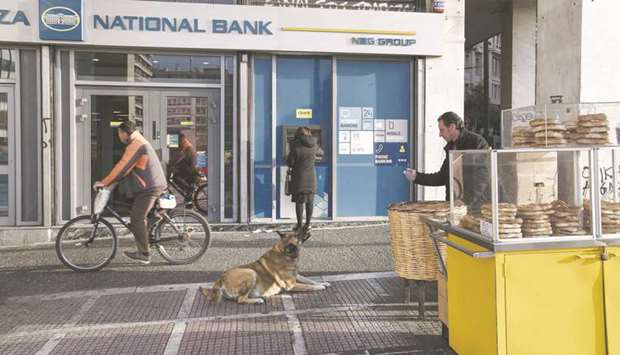Greek banks may see bad debt levels surge to half their loan book because of the impact of the coronavirus on the country’s weakened economy, according to people familiar with the matter.
The economic shutdown will probably push non-performing credit up from about 40%, or €68bn ($74bn), at the end of December, the people said, asking to remain anonymous because the estimate isn’t public. The increase will amount to about €10bn despite flexibility European authorities have afforded banks in deciding whether to classify loans as non-performing, one of the people said.
Regulators around the world are giving banks unprecedented relief while Europe’s richest states are offering hundreds of billions of euros in loan guarantees to keep credit flowing to the economy. Yet Greek lenders, still struggling with the aftermath of the 2012 sovereign debt crisis, risk being moved back to square one as the coronavirus complicates the country’s ambitious plan to pare back its bad loans.
Bank of Greece governor Yannis Stournaras is calling for the euro area or individual member states to set up a state-backed bad bank to take soured debt off lenders’ balance sheets to focus on lending. The Greek central bank is working on a scenario to see what effect the solution would have on the country, according to the people.
A 2017 proposal to establish such asset management companies didn’t take off because they would run afoul of European rules designed to limit taxpayer-funded rescues of banks. A revived discussion this year has been met with scepticism in Germany and other countries, Bloomberg reported last month.
Before the spread of the virus this year, the Greek government had put in place an Italian-style asset protection plan known as Hercules to help lenders cut their bad loans by 40%. According to the plan, the banks will package their soured debt into securities and sell them with the help of a partial state guarantee.
An official for Greece’s Finance Ministry said Hercules is the only project and there are no plans for a bad bank at the moment. But it will support any European plan that will strengthen banking sector, the official said.
Greece’s top four lenders – National Bank of Greece SA, Eurobank Ergasias SA, Alpha Bank SA and Piraeus Bank SA – have pledged to use Hercules and Eurobank has already requested the state guarantee for its first securitisation. The coronavirus outbreak has created delays in their plans but banks remain committed to reducing bad loans by about €50bn by 2021.

A street vendor feeds a stray dog outside a National Bank of Greece bank branch in Athens. Greek lenders, still struggling with the aftermath of the 2012 sovereign debt crisis, risk being moved back to square one as the coronavirus complicates the country’s ambitious plan to pare back its bad loans.
